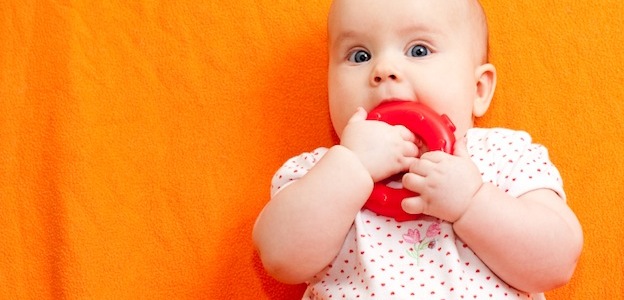SingaporeMotherhood | Baby & Toddler
October 2013
All About Teething

Teething is one of the many milestones in a baby’s first year and like colic, it makes parents feel helpless and wish we could be the one suffering instead of the child. When my daughter started sleeping fitfully and waking up crying when she was about two and half years old, I was puzzled. She was not running a fever. Neither was she hungry.
It only when I took a good look into her mouth that I realised the reason. Her second molars were coming in. Her gums were so sore, the poor girl could not sleep properly. Teething toys were no help and teething gels provided fleeting relief. I had to dose her with painkillers for a few nights just so that she could catch up on her sleep.
Once teeth appear, parents need to keep them clean to prevent cavities from forming. If it is too hard to brush the teeth on a squirming baby, a clean washcloth wrapped around a finger will do the job. Permanent teeth will only come in when your child is about six years old.
[banner][/banner]
When it Starts
Babies usually start teething between six and nine months old. However, some may start as early as three months and others as late as one year. Regardless of when they start teething, a child should have the whole set of 20 baby teeth by the time she is three years old.
Symptoms and Signs
1. Drooling and Rashes
Some babies have teeth which come in one by one over the course of a year, while others have teeth which seem to erupt all in one go. No matter how the teeth come in, they are almost always marked by constant drooling and increased fussiness. Some babies will also develop rashes around the chin and mouth area because of the constant drooling. To alleviate the problem, clean the chin and mouth area gently and regularly with a soft washcloth. Applying a cream like Vaseline, Aquaphor or even lanolin nursing cream can help to heal the skin and also provide a barrier between the skin and the saliva.
2. Feeding Less
Some babies are extra irritable when teething because they feed less due to their sore gums. “Babies may feed less and sometimes cry for periods of time, even at night. Occasionally, they may develop a low grade temperature, but generally, teething does not produce high temperatures for days,” says Dr Chan Poh Chong, Senior Consultant at National University Hospital’s Division of General Ambulatory Paediatrics and Adolescent Medicine.
3. Getting the Runs
While it is not unusual for babies to have diarrhoea when teething, it is not necessarily a feature of teething. Babies tend to chew on their fingers and toys during tooth eruption. This may lead to a gut infection which results in diarrhoea, Dr Chan explains. That is why parents need to ensure that all teething toys and baby’s hands are kept clean.
4. Chomping and Biting
Some babies may also start chomping on their caregivers. This is because biting provides some relief to sore gums. To head off this problem, ensure that your child has easy access to teething toys. If Baby starts chomping on your fingers, say “no biting”, gently remove your fingers, and give the child a teething toy. If Baby still prefers your fingers, put her down if you are carrying her. Very soon, she will understand that biting is not okay, and that she will lose your attention if she continues.
When my daughter was in the early days of teething, teething rings, teething biscuits and teething gels helped alleviate her discomfort. I kept gel and toys in the fridge as the cold helps to numb the sore gums. Some mothers use more holistic methods to help their children. Mabel Poon relied on an amber teething necklace to help her daughter, who had just turned two, thorough teething pain.
“The necklace is said to soothe and calm the baby when teething. It helped Alyssa as she wasn’t as cranky and she didn’t drool as much either,” says Mabel. There is also little risk of her choking on the beads as there is a knot between each bead.
In most cases, teething rings and teething gels are sufficient to soothe the sore gums. However, in more severe cases, painkillers like paracetamol may be needed, says Dr Chan. It is best to consult with your child’s paediatrician before giving her any medication.
All content from this article, including images, cannot be reproduced without credits or written permission from SingaporeMotherhood.
Follow us on Facebook, Instagram, and Telegram for the latest article and promotion updates.






